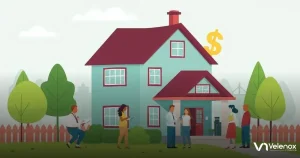Secured loans are a popular financial option that allows borrowers to access substantial amounts of money at favorable interest rates by offering an asset, such as a home, car, or savings account, as collateral. This arrangement reduces the lender’s risk, enabling them to provide lower interest rates and better terms compared to unsecured loans. However, it is essential for borrowers to understand that defaulting on a secured loan can result in the lender repossessing the collateral.
Understanding secured loans
Secured loans are a popular choice for those looking to borrow substantial amounts of money at favorable interest rates. These loans require borrowers to offer an asset as collateral, such as a home, car, or other valuable property.
The collateral serves as a security for the lender, reducing their risk. As a result, lenders are often willing to offer lower interest rates and better terms compared to unsecured loans.
It’s important to understand that if you default on a secured loan, the lender has the right to repossess the asset used as collateral. This makes it crucial to assess your ability to repay the loan before committing.
ADVERTISEMENT
Common assets used as collateral include real estate, vehicles, and savings accounts. The value of the collateral typically needs to equal or exceed the loan amount.
Secured loans are commonly used for large purchases or major projects like buying a house, a car, or financing home improvements. Borrowers can also use these loans to consolidate debt at a lower interest rate.
Benefits of secured loans

Lower Interest Rates: One of the primary benefits of secured loans is that they often come with lower interest rates compared to unsecured loans. The collateral reduces the risk for lenders, allowing them to offer more competitive rates.
Higher Borrowing Limits: Secured loans generally allow for higher borrowing amounts. Because the lender has the assurance of collateral, they are more willing to extend larger loans.
Improved Approval Chances: For those with poor or limited credit history, securing a loan with collateral can significantly increase the likelihood of approval. Lenders view the loan as less risky, making them more inclined to approve your application.
Flexible Repayment Terms: Many secured loans offer more flexible repayment options. Borrowers can negotiate terms that fit their financial situation, making it easier to manage repayments.
Potential to Improve Credit Score: Successfully managing and repaying a secured loan can have a positive impact on your credit score. Timely repayments demonstrate financial responsibility, which can improve your creditworthiness.
Types of secured loans
Secured loans come in various forms, each designed to meet different financial needs. Here are some common types:
Mortgage
A mortgage is a secured loan where your home acts as collateral. It’s used to finance the purchase of real estate. Mortgages typically offer lower interest rates due to the collateral involved.
Auto Loan
An auto loan is secured by the vehicle you intend to purchase. Since the car is collateral, these loans often come with competitive rates and flexible terms, making it easier to buy a new or used vehicle.
Personal Secured Loan
This type of loan uses personal assets, like savings accounts or CDs, as collateral. Personal secured loans generally have lower interest rates compared to unsecured personal loans, making them a cost-effective option for borrowing.
Home Equity Loan
A home equity loan allows you to borrow against the equity in your home. The loan amount is based on the difference between your home’s market value and the remaining mortgage balance. Home equity loans often have favorable terms and can be used for various purposes, such as home improvements or debt consolidation.
HELOC (Home Equity Line of Credit)
Similar to home equity loans, a HELOC uses your home as collateral but works more like a credit card. You’re given a credit limit, and you can borrow as needed. This flexibility makes HELOCs an attractive option for ongoing expenses or projects.
Understanding these different types of secured loans can help you choose the best option for your financial situation, whether you’re looking to purchase a home, buy a car, or finance a significant expense.
How to apply for a secured loan

When you’re ready to apply for a secured loan, there are several steps you need to follow. First, gather all necessary documents, including identification, proof of income, and collateral details.
Research and Compare Lenders – Take the time to research and compare different lenders. Look into their interest rates, terms, and conditions. This will help you find the lender that offers the best deal for your needs.
Check Your Credit Score – Your credit score plays a crucial role in the approval process. A higher score can lead to better interest rates and terms. If your score is low, you might want to take steps to improve it before applying.
Prepare Collateral – Since secured loans require collateral, make sure you have an asset ready to offer. This could be your home, car, or another valuable property. Ensure the value of your collateral meets the lender’s requirements.
Complete the Application – Fill out the application form with accurate and complete information. Double-check your details to avoid any mistakes that could delay the approval process.
Submit the Application – Submit your application along with all required documents. Some lenders offer the convenience of online applications, while others may require you to apply in person.
Once submitted, wait for approval. The lender will review your application, evaluate your credit score, and assess the value of your collateral. If everything checks out, you’ll receive an offer outlining the loan terms.
Review and Sign Agreement – Carefully review the loan agreement. Pay attention to the interest rate, repayment schedule, and any additional fees. If you agree with the terms, sign the agreement to finalize the loan.
Receive Funds – After signing the agreement, the lender will disburse the loan amount. You can use the funds for your intended purpose, whether it’s consolidating debt, making a large purchase, or covering other expenses.
Tips for getting approved
Applying for a secured loan can seem daunting, but with the right tips, you can increase your chances of approval. First, ensure you have all the necessary documents ready. This includes proof of income, identification, and collateral documentation. Having these on hand will speed up the process.
Work on improving your credit score. Lenders favor applicants with good credit, so pay off any outstanding debts and avoid taking on new ones. Regularly check your credit report for inaccuracies and get them fixed promptly.
It’s also wise to shop around for the best lender. Compare rates, terms, and requirements from different financial institutions. This will help you find the most favorable conditions tailored to your financial situation.
Make sure your collateral is valuable and well-documented. The higher the collateral value, the better your loan terms could be. Keep all relevant paperwork organized and up-to-date.
Prepare a compelling loan application. Clearly state the purpose of the loan and how you plan to repay it. Demonstrating a solid repayment plan can significantly boost your approval chances.





